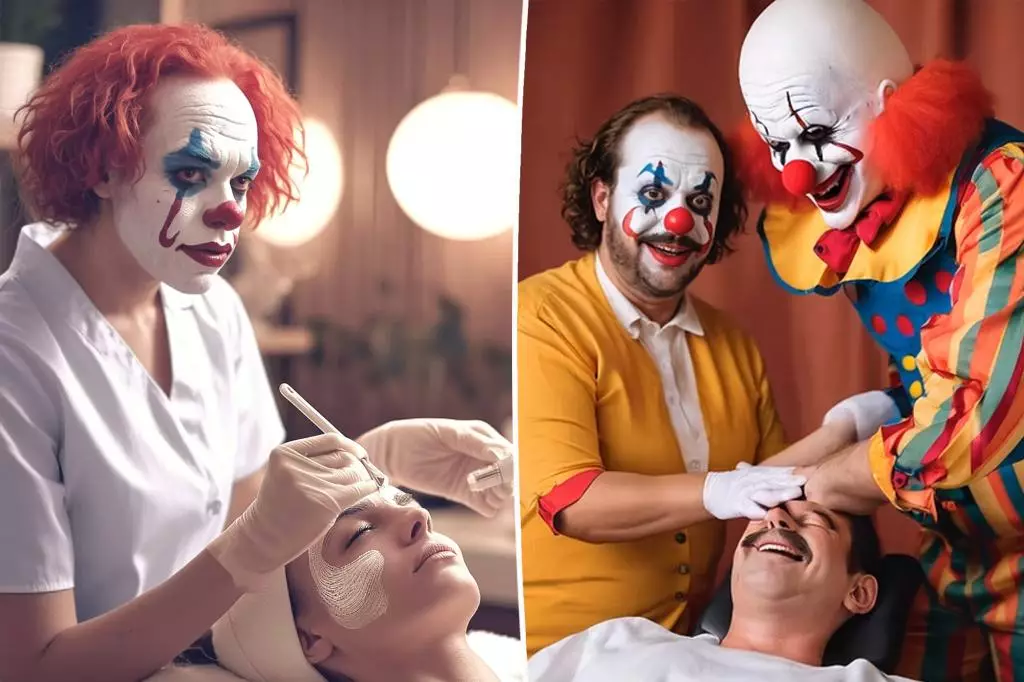In an age where wellness culture often straddles the line between earnest pursuit and farcical exaggeration, a quirky new trend has emerged in the picturesque Hamptons: clown therapy. An anonymous prankster or perhaps an elaborate collective is using humor to critique the very essence of wellness through a witty, satirical service named “East Hampton Clown Massage.” This unique parody takes aim at the sometimes ludicrous aspects of wellness trends, offering a light-hearted yet sincere commentary on society’s obsession with self-care techniques. It illustrates how absurdity can serve as a powerful vehicle for connection and conversation in what can feel like an overly serious world.
The Commotion of Clowns
The prankster behind this clever ruse is undoubtedly well-versed in the customs surrounding the affluent Hamptons community. The website presents a highly stylized, tongue-in-cheek aesthetic showcasing clowns providing massages on the beach, complete with humorous product offerings and faux celebrity endorsements. Unlike any conventional wellness service, these clowns offer treatments with eccentric names like “Scream” and “Joeky Reiki Bakey,” merging humor and healing into an unexpected package. By doing so, they invite patrons to reflect on what wellness actually means, encouraging a sense of community through laughter and shared experiences in a typically exclusive environment.
Performance as Healing
What sets clown therapy apart is not only its outrageous concepts—such as a massage infused with dad jokes and cannabis—but also its underlying philosophy. The idea is centered around emotional release, emphasizing the therapeutic power of laughter. Just as laughter has long been considered a universal remedy for stress and sadness, “East Hampton Clown Massage” suggests that humor can also aid in the exploration of one’s emotional landscape. The presence of jesters and playful characters serves to shift perspectives and create an atmosphere where healing feels accessible and fun.
A Critique of Luxury Wellness
Beneath the playful facade lies a critical examination of the luxury wellness industry, which often prioritizes marketability over genuine well-being. The clown massage concept ironically exposes the extravagance within wellness rituals, epitomized by fake products like “clown make-up remover” retailing at outrageous prices. By glamorizing trivialities, the creators of this prank call into question what society values in the realm of well-being. They imply that while authenticity and sincerity are important in healing modalities, there’s also room for levity, absurdity, and perhaps even a bit of self-deprecation.
Subversive Celebrity Culture
The fabricated endorsements from notable figures further deepen the satire, drawing upon recognizable personas to anchor the outrageousness in a sense of familiarity. The idea that local figures such as “Lizzie G.” resonate with the Hamptons’ lore emphasizes both the sincerity and absurdity of placing value on wellness. Additionally, the imaginary testimonials from fictitious clients like “Gywneth P.” encourage the audience to see the ridiculousness that can emerge from unfettered celebrity fascination with wellness. How many trends have we seen rise from the glossy pages of a magazine or social media feed? This parody is an invitation to detach from the hype and engage critically with the wellness industry.
The Genius of Delivery
The brilliance of the clown massage hoax also lies in its clever execution. By remaining anonymous, the pranksters maintain a veil of intrigue that fuels speculation among locals. Their quaint, fictional narratives about the clowns’ backgrounds add another layer, mixing whimsical charm with societal commentary. One clown’s affinity for “Ayahuasca retreats” in exotic locations juxtaposes the sophistication of upscale retreats with the innocence of clowning, creating a humorous dissonance. This layered approach not only entertains but also invites deeper reflection on what we value in therapeutic practices.
Ultimately, “East Hampton Clown Massage” is not just a satirical service but an artistic critique that resonates amid the chaotic pursuit of wellness. By invoking laughter, the project challenges us to question our perceptions of healing, community, and the complexities of a culture that often takes itself too seriously. It reminds us of the underappreciated truth: sometimes, healing begins with a good laugh.

